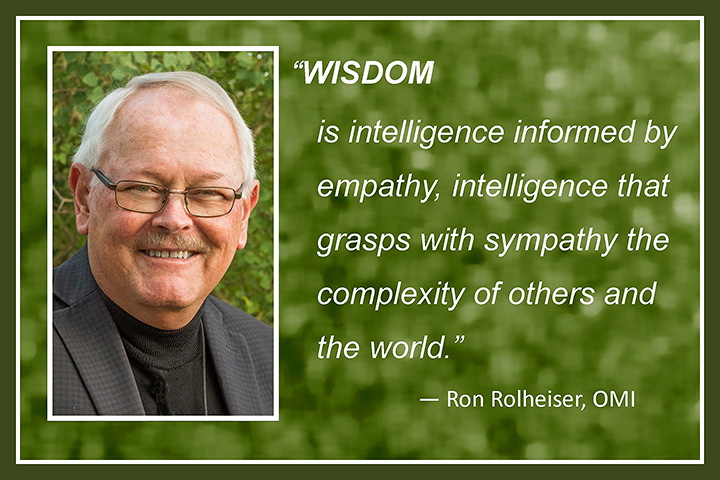
A Golden Rule for wisdom?COFFEE WITH WARREN, with Warren Harbeck |

|
Think unto others as you would have them think unto you. Hmmm…. Do we have a Golden Rule for wisdom here? A recent column by one of our longtime coffee companions really got me thinking. Ron Rolheiser, OMI, President of the Oblate School of Theology, San Antonio, Texas, and a frequent speaker at Mount St. Francis Retreat Centre, Cochrane, was the inspiration for my becoming a columnist 31 years ago. And he continues to inspire me with his spiritually grounded wisdom. Ah, wisdom. This is a question I’ve given much thought to over the years, inspired also by the sages of old and Elders of the Stoney Nakoda First Nation. And its answer affects me not only as a writer and Scripture scholar, but even more so as someone striving to become fully human. In his Aug. 12 column, Intelligence versus Wisdom, the popular spirituality writer/speaker declares: “There's a huge difference between being bright and being wise, between brilliance and wisdom. We can be highly intelligent, but not very wise.” And with that we will all agree. “We're living in a culture that rewards brilliance above wisdom,” he laments. In education, business, the sciences, and life in general, we typically ask: “Who’s the most brilliant?” But how often do we ask, “Who’s the wisest?” “We're a highly informed and intelligent people, but our compassion is not nearly on par with our brilliance. We're bright, but not wise.” Compassion? What does that have to do with wisdom? “Everything!” Rolheiser asserts. “Wisdom is intelligence informed by empathy, intelligence that grasps with sympathy the complexity of others and the world, and this has implications. “Learning, to be truly helpful, must be matched by an equal growth in empathy. When this isn't happening, then growth in intelligence will invariably be one-sided and, while perhaps providing something for the community, will always lack the kind of understanding that can help bind the community together and help us better understand ourselves and our world. “When intelligence is not informed by empathy, what it produces will generally not contribute to the common good. Without a concomitant empathy, intelligence invariably becomes arrogant and condescending. True learning, on the other hand, is humble, self-effacing, and empathic,” he says. However, such wisdom is not opposed to intelligence. “Empathy turns intelligence into wisdom and wisdom turns learning into something that more properly serves community,” says Rolheiser, B.A., B.Th., M.A., M.Sc, and PhD/STD, author of a dozen books and columnist in over 90 newspapers in five different countries. But “empathy is not to be confused with sentimentality or naiveté, as is sometimes the case. Sentimentality and naiveté see a fault within intellectuality itself, seeing learning itself as the problem. But learning is never the problem. One-sided learning is the problem, namely, learning that isn't sufficiently informed by empathy, which seeks knowledge without understanding.” Empathy-based wisdom, then, is all about walking a mile in the other person’s shoes, as the old saying goes. It’s about knowledge with compassion. Yes, this just might be thought of as the Golden Rule for wisdom: Think unto others as you would have them think unto you – with head and heart.
© 2019 Warren Harbeck |